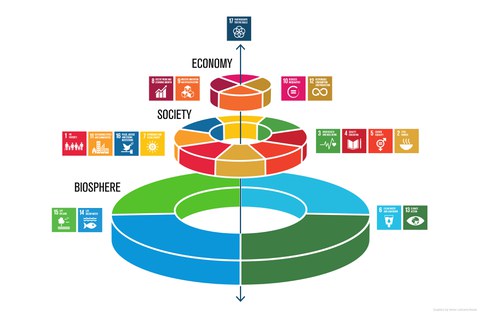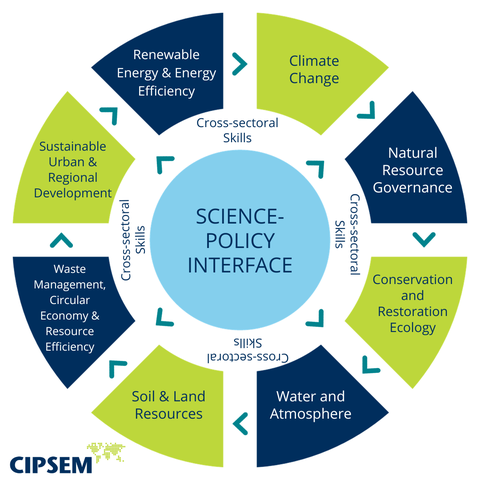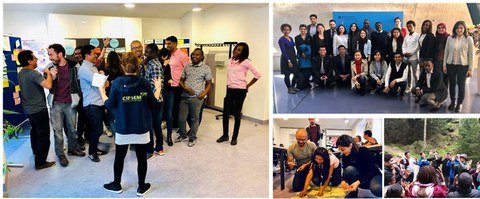49th UNEP/UNESCO/BMUKN International Postgraduate Course on Environmental Management for Developing Countries (EM49)
Duration: January 8, 2026 – July 24, 2026 (on-site in Dresden)
This course is particularly designed for decision-makers of public governance and administration both at the national and local level requiring an overall-competence in environmental matters.
Motivation
The adoption of the Sustainable Development Goals (SDGs) by the United Nations in 2015 marked a significant milestone in global sustainable development. For the first time, the world collectively committed to pursuing a comprehensive set of common goals. These encompassed critical areas ranging from climate action to promoting sustainable economic growth, from securing life under water to promoting sustainable cities, from addressing hunger and poverty to advocating for responsible consumption and production, and from reducing inequalities to promoting inclusive industrialization.
Course concept and objectives
The 2030 Agenda, encapsulated in the SDGs (Figure 1), recognizes that the preservation of our biosphere depends on responsible and sustainable stewardship of planet Earth. It underscores the interconnectedness of various aspects of human activity with the health and vitality of our environment, and emphasizes the need for a holistic and forward-looking approach to global challenges. Globally, however, the realization of the ambitious goals set by the SDGs has fallen significantly behind schedule. To address this challenge and align with the goals of these important international agreements, the UNEP/UNESCO/BMUKN 6-month course takes an integrated and interdisciplinary approach, encompassing key facets of sustainability and environmental management.

Figure 1: The SDGs wedding cake – economies and societies as embedded parts of the biosphere (Source: Rockström and Sukhdev 2016, Azote Images for Stockholm Resilience Centre)
The curriculum (Figure 2) is organized into several modules covering conservation and restoration ecology, water and atmosphere, soil and land resources, sustainable urban and regional development, waste management, circular economy and resource efficiency, renewable energy and energy efficiency, climate change, and natural resource governance. An overarching science-policy interface frames all disciplines.

Figure 2: Modular structure of the course contents of the UNEP/UNESCO/BMUV International Postgraduate Course on Environmental Management for Developing Countries (EM)
In addition, all participants will acquire basic skills with cross-sectoral relevance, such as policy advice, presentation skills, project planning and management, which can be applied in the context of their local realities, as well as communication across disciplines and cultures, participatory governance practices, and understanding of geo-information.
CIPSEM follows an integrative and interdisciplinary approach to teaching, which provides knowledge about global environmental processes and methods for sustainable resource management and fosters the ability to think holistically about environmental problems and solutions. The overall approach is to combine academic knowledge with local, traditional, and professional expertise. Practical exercises, group work, interaction with fellow participants from different regions of the world, and a variety of excursions enhance the curriculum. For example, participants spend a few days at the International Academy for Nature Conservation, Isle of Vilm (INA - BfN) each year. The conference center is located in the beautiful nature of the small island of Vilm near Rügen in the Baltic Sea.
The lectures are given by professors of TUD Dresden University of Technology and experts from various national and international institutions — from the German Environment Agency, the German Federal Ministry of Environment, Nature Conservation, Nuclear Safety and Consumer Protection, UNU-FLORES, the Federal Agency for Nature Conservation, the Leibniz Institute of Ecological Urban and Regional Development, among many others. The course program also includes contributions from CIPSEM alumni. Participants are required to carry out a research project, in the form of a scientific paper, on a specific environmental topic of their choice and to present the results of this work in a symposium at the end of the course.
To give you a more profound understanding of the EM49 course, we've included the agendas for the two previous courses, EM48 (2025, Download EM48 Program here) and EM47 (2024, Download EM47 Program here). This will provide you with an idea of the topics covered, the expertise of our expert contributors, and the hands-on learning opportunities during the excursions.
The EM48 and EM47 agendas provide a comprehensive overview of the course structure, including the topics covered, the programme, and the activities. You will also get a sense of the expertise of our expert contributors and the hands-on learning opportunities during the excursions.
Please note that the EM49 agenda will be similar to that of previous courses, with some variations depending on the facilitators' availability. We will ensure that the main topics and activities remain consistent, providing a high-quality learning experience for all participants.
Target groups
This course is particularly designed for qualified professionals and future leaders of public governance and administration at the national, regional, and local levels, requiring overall competence in environmental matters. However, professionals from science, the economy, or civil society who already bear responsibility for sustainable development in their countries are also welcome to apply. To be eligible, candidates need to originate from and work in developing countries, including emerging economies. Applicants also need to have several years of professional practice in the course's scope for a mutually beneficial exchange of experiences. A first university degree (e.g. BA, B.Sc.), adequate communication skills in the English language, and the delegating institution's nomination are mandatory.

Figure 3: Impressions from past trainings on environmental management
Application and participation
Qualified professionals are welcome to apply for this training from 18 March until 23 April 2025 on CIPSEM’s online application portal. The Steering Committee selects 21 participants for this course by the end of July/early August 2025. Selected participants will be informed via email.
Participants stay in our comfortable single studio apartments and receive a stipend to cover basic living expenses (€550/month). In addition, flights, health insurance, public transport tickets, costs of overnight stays for excursions etc., will be covered. The course office will provide additional manifold assistance.
Participants successfully completing this course will be awarded a Postgraduate Diploma in Environmental Management.
Please note that the duration stated at the beginning corresponds to the financing period. This includes the course period from January 15, 2026 – July 17, 2026, as well as seven arrival days before the start of the course and seven departure days after the end of the course.
You can access the online application portal via the following link: https://crm.bu.tu-dresden.de/ausschreibung?call=CIPSEM2025-EM49
Before applying, please also take a look at our hints on application, explanations regarding the application portal, and answers to frequently asked questions. For information on other courses, please visit https://tud.de/cipsem/upcoming.
► If you have an important question that is not addressed on our website or in the help texts within the application form, please contact us at . Before reaching out, we ask you to check the resources provided thoroughly.


